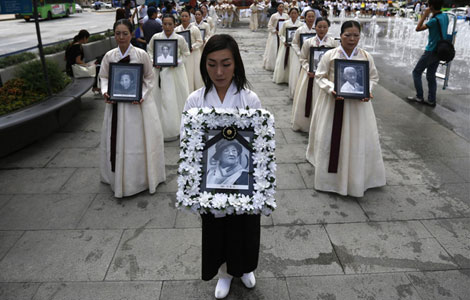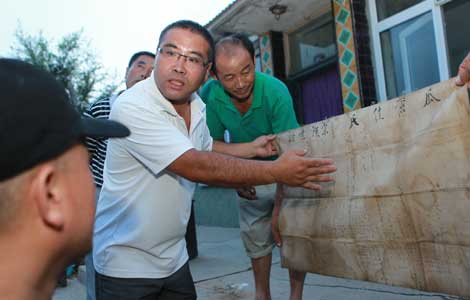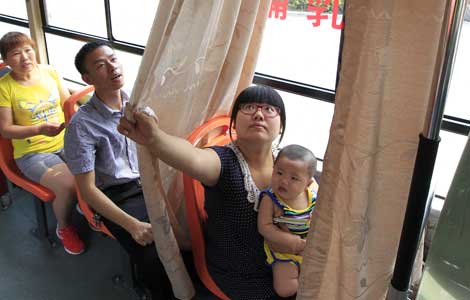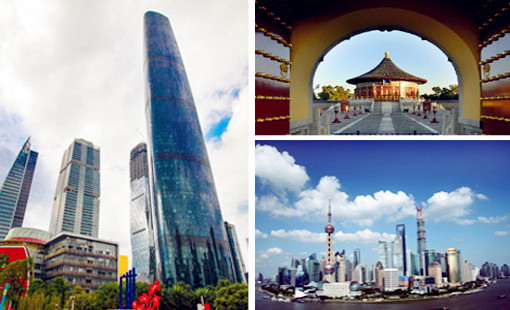At the end, to be or not to be
Updated: 2013-08-15 08:07
By Gao Zhuyuan (China Daily)
|
||||||||
The campaign for people to write a living will while they are able is gaining ground in China's fast aging society
Singapore's founding father Lee Kuan Yew wrote in his new book One Man's View of the World that there is an end to everything and he wants his "to come as quickly and painlessly as possible", instead of being incapacitated in bed and with a tube inserted into his nostrils and down to his stomach.
The 89-year-old's musings over death are a mirror of the times, as advances in medicine and technology, such as mechanical ventilators and feeding tubes, have not only helped to save more lives, they also at times prolong the process of dying, sometimes against people's wishes.
When the right-to-die movement in the West began to flourish in the 1970s, emphasizing patients' right to refuse life support, Chinese people generally died at home, accepting death and dying as part of the natural cycle of life.
Nowadays, more people in China spend their last days in hospital, with their dying process extended by costly medical interventions, which can neither reverse the underlying medical conditions nor improve their quality of life. Some aggressive end-of-life care even increases patients' suffering.
This has given rise to the crusade for people's right to decide whether to refuse life support when reaching the terminal phase of an illness, and today the discussions about the end-of-life decision to forgo or stop life support are beginning to gain traction in China, as the country is aging at an unprecedented rate.
China is predicted to overtake Japan to become the world's most aging society by 2030, and about one in four people in the country will be aged 65 or above by 2050. The aging population is now considered a major reason for the rise in the national cancer rate, which has climbed to an alarming height, with six new cancer patients being diagnosed every minute. One in seven people who have cancer will die.
A rapidly aging society entails increased risks of aging-associated illnesses, such as cancer, heart disease and strokes. People should think ahead about their dying and whether they want life support as they might not be in a position to choose when the time comes.
There is no specific law in China at present entitling people to refuse life support to avoid experiencing a painful death. Family members generally make the decision, and in most cases, they try hard to get medical treatment that might prolong the lives of their loved ones, even though the patients might not want the treatment.
Despite his repeated request for a quick exit, the writer Ba Jin was bedridden and hooked up to life-sustaining facilities for six years before he died of cancer and other diseases at the age of 100 in 2005. As he said, he was forced to linger on because people wanted him to.
An association was recently founded in Beijing, the first of its kind in China, to promote the concept that it is necessary for each adult to sign a living will in advance about their wishes regarding life-prolonging treatment, in the event of either terminal illness or being in a permanent vegetative state that disables them from speaking for themselves.
The living-will campaign can go beyond the express purpose of advocating a patient's autonomy. The life-prolonging therapy that keeps the terminally ill alive on the brink of death often results in a painful and emotionally wrenching experience, and it can eat up a family's savings.
Some patients prematurely end their lives to save themselves from suffering and their loved ones from backbreaking medical bills. A 67-year-old woman in Wuhan who had terminal colon cancer drowned herself earlier this year with the help of her husband, who said she wanted to put an end to her pain. The old man was recently given a four-year sentence.
It may sound ruthless to talk about saving medical resources by withholding or withdrawing life support for the terminally ill, but the rational use of available resources could give more people the chance of life.
Besides, termination of life support in the last days does not necessarily point to medical inaction. End-of-life services, such as hospice care, are aimed at alleviating suffering and maximizing the quality of life for dying patients and it tends to cost less than conventional treatment, as some studies show.
Death as a natural process, anticipated under less expensive hospice and palliative care rather than aggressive medical intervention, can serve as a viable solution. It embodies patients' autonomy and helps optimize the use of medical resources, which holds significant meaning at a time when the rapidly aging society is putting unrelenting pressure on the country's medical system.
It will require the determination and effort to compare the examples of other countries and regions and then enact a natural death act and legalize living wills that conform to the nation's conditions, but the pitfalls of a rapidly aging population simply leave no leeway for the country to sidestep the issue any longer.
The author is a writer with China Daily. gaozhuyuan@chinadaily.com.cn
(China Daily USA 08/15/2013 page11)

 Spielberg has desire to work with Zhang Yimou
Spielberg has desire to work with Zhang Yimou
 Requiem ceremony for former comfort woman
Requiem ceremony for former comfort woman
 Egypt forces crush protesters
Egypt forces crush protesters
 Two killed in fiery crash of UPS cargo jet
Two killed in fiery crash of UPS cargo jet
 Yao dreams of sports for fun with towering charity
Yao dreams of sports for fun with towering charity
 Re-enacting ancestors' journey to the west
Re-enacting ancestors' journey to the west
 Special bus seat for breast-feeding mothers
Special bus seat for breast-feeding mothers
 Northern exposure
Northern exposure
Most Viewed
Editor's Picks

|

|

|

|

|

|
Today's Top News
US asks China's help on DPRK issues
Movie tax flack is settled
Manning 'sorry' for US secrets breach
China to be world's No 1 consumer
Gold rises on physical buying from Asia
Millionaires hold dimmer view: Survey
China to probe foreign automakers
Snowden case not to affect US-Russia talks
US Weekly

|

|





